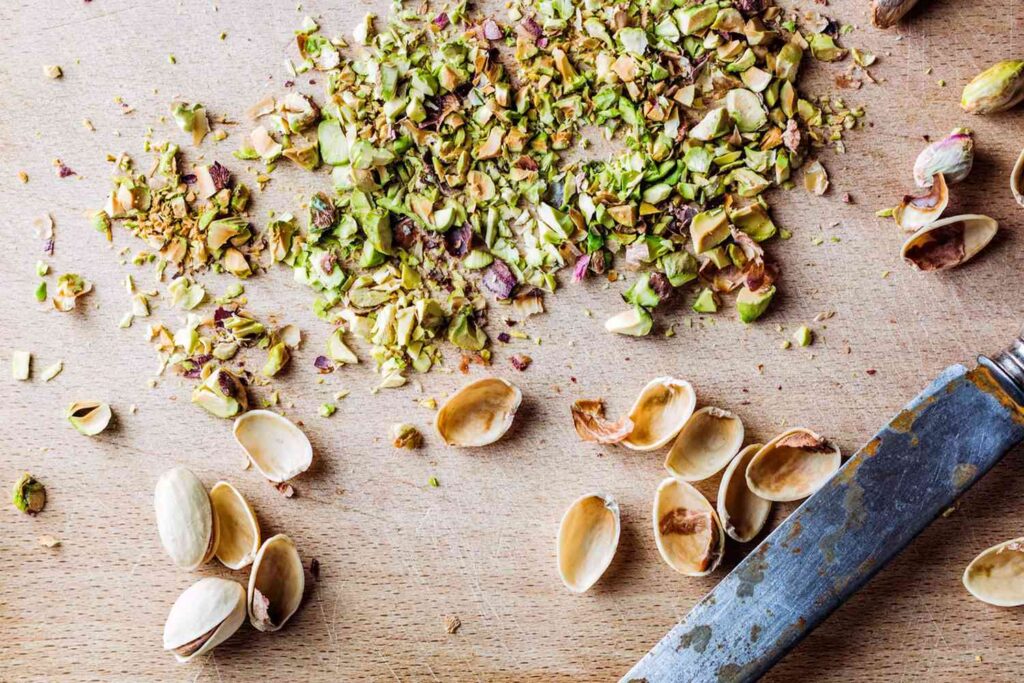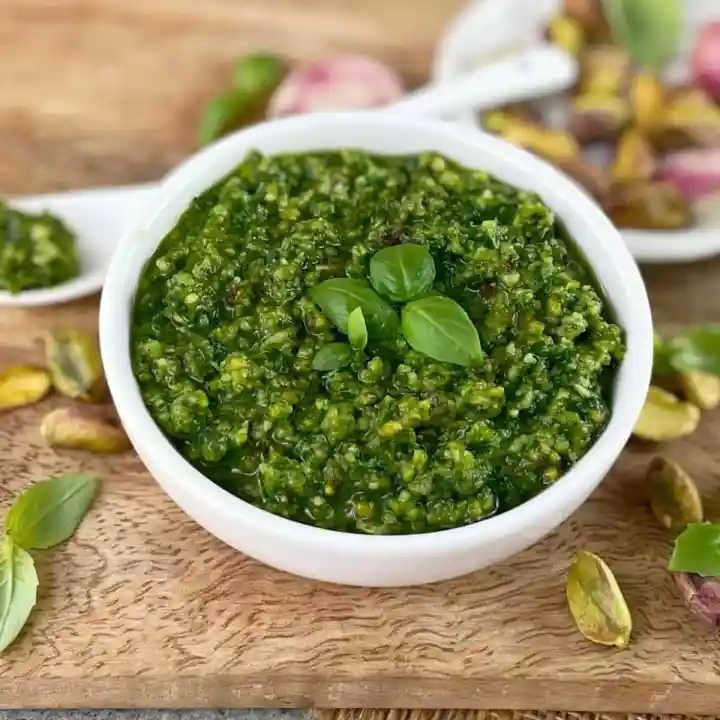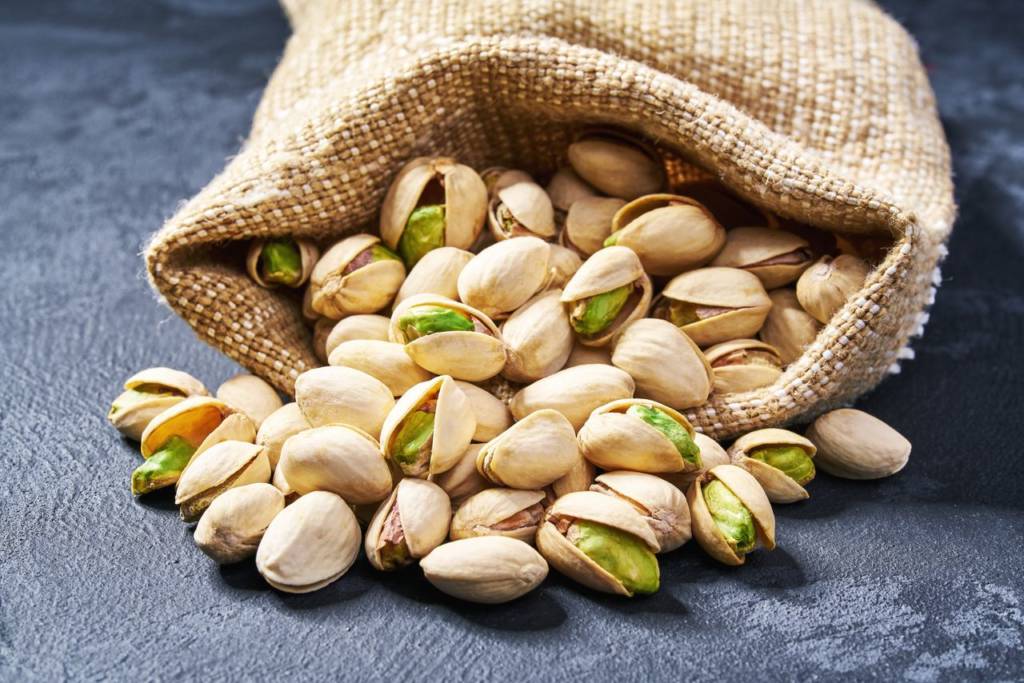Pistachio pesto is not just a delicious addition to your meals; it’s also packed with numerous health benefits. This versatile sauce combines the rich flavors of pistachios, olive oil, and other fresh ingredients to create a nutrient-dense condiment that can enhance your diet in many ways.
In this article, we’ll explore the various health benefits of pistachio pesto, focusing on its nutritional components, antioxidant properties, and contributions to heart health and weight management.

Nutritional Breakdown
Pistachio pesto is a nutritional powerhouse, providing a wide range of essential nutrients. Understanding the nutritional breakdown of pistachio pesto can help you appreciate its health benefits more fully.
Vitamins and Minerals in Pistachios
Pistachios are the star ingredient in pistachio pesto, and they are loaded with vitamins and minerals. These small nuts are particularly high in vitamin B6, which is vital for protein metabolism and cognitive development. They also contain significant amounts of vitamin K, which is essential for blood clotting and bone health.
Pistachios are a good source of manganese, a mineral that plays a role in bone formation, blood clotting, and reducing inflammation. Additionally, they provide a healthy dose of phosphorus, crucial for energy production and DNA synthesis, and potassium, which helps regulate blood pressure and maintain proper muscle and nerve function.

Healthy Fats in Olive Oil
Olive oil is another key component of pistachio pesto, contributing to its rich, smooth texture and numerous health benefits. Olive oil is high in monounsaturated fats, particularly oleic acid, which has been linked to reduced inflammation and improved heart health.
Monounsaturated fats are known to lower bad cholesterol levels (LDL) and maintain good cholesterol levels (HDL), thereby reducing the risk of heart disease. Olive oil also contains a range of antioxidants, including vitamin E, which protects cells from oxidative damage and supports skin health.

Health Benefits of Pistachios
- Impact on Cholesterol Levels: Pistachios are known to positively impact cholesterol levels. They contain a significant amount of monounsaturated and polyunsaturated fats, which are beneficial for heart health. These healthy fats help reduce LDL (bad) cholesterol and increase HDL (good) cholesterol levels. Studies have shown that incorporating pistachios into a balanced diet can lower the risk of cardiovascular diseases by improving lipid profiles and reducing oxidative stress.
- Rich in Monounsaturated and Polyunsaturated Fats: The fats in pistachios, primarily monounsaturated and polyunsaturated, are heart-healthy. Monounsaturated fats help reduce bad cholesterol levels in the blood, which can lower the risk of heart disease and stroke. Polyunsaturated fats, including omega-3 and omega-6 fatty acids, are essential fats that our bodies need but cannot produce independently.
Antioxidant Properties
- Key Antioxidants: Lutein, Zeaxanthin, Beta-Carotene: Pistachios are rich in antioxidants, including lutein, zeaxanthin, and beta-carotene. These antioxidants are crucial for protecting the body’s cells from damage caused by free radicals. Lutein and zeaxanthin are particularly important for eye health, as they help prevent age-related macular degeneration and cataracts.
- Benefits for Eye Health and Overall Cellular Protection: The antioxidants in pistachios not only support eye health but also provide overall cellular protection. They help combat oxidative stress and inflammation, which are linked to various chronic diseases, including heart disease and cancer. By reducing oxidative damage, these antioxidants contribute to long-term health and wellness.
Digestive Health
- High Fiber Content: Pistachios are an excellent source of dietary fiber, with about 3 grams of fiber per ounce. This high fiber content aids in digestion and promotes regular bowel movements. It also helps prevent constipation and supports overall digestive health.
- Promotion of Healthy Gut Bacteria: The fiber in pistachios acts as a prebiotic, nourishing the beneficial bacteria in the gut. A healthy gut microbiome is essential for proper digestion, immune function, and even mental health. Consuming pistachios regularly can help maintain a balanced gut flora, which is crucial for overall health.
Protein Powerhouse
Complete Protein Source with All Essential Amino Acids: Pistachios are one of the few plant-based sources of complete protein, meaning they contain all nine essential amino acids that the body cannot produce on its own. This makes them an excellent choice for vegetarians and vegans looking to meet their protein needs. A serving of pistachios provides about 6 grams of protein, supporting muscle repair and growth.
Blood Sugar Regulation
- Low Glycemic Index: Pistachios have a low glycemic index, which means they do not cause a rapid spike in blood sugar levels. This makes them an ideal snack for people with diabetes or those looking to maintain stable blood sugar levels. The combination of fiber, healthy fats, and protein in pistachios helps slow down the absorption of sugar into the bloodstream, preventing sudden spikes.
- Benefits for Diabetes Management: Regular consumption of pistachios can aid in diabetes management by improving blood glucose levels and insulin sensitivity. The nutrients in pistachios, such as fiber and antioxidants, help reduce inflammation and oxidative stress, which are common issues in diabetes. Incorporating pistachios into a balanced diet can support better glycemic control and overall health for individuals with diabetes.
Antioxidant Properties
One of the standout features of pistachio pesto is its high antioxidant content. Antioxidants are compounds that help neutralize free radicals in the body, reducing oxidative stress and lowering the risk of chronic diseases.
Pistachios are rich in antioxidants such as lutein and zeaxanthin, which are beneficial for eye health, protecting against age-related macular degeneration and cataracts. Additionally, the vitamin E in olive oil adds to the antioxidant power of pistachio pesto, helping to protect cells from damage and support overall health.

Benefits for Heart Health
Pistachio pesto offers several benefits for heart health, making it a heart-friendly addition to your diet. The combination of pistachios and olive oil creates a nutrient-dense sauce that supports cardiovascular well-being in multiple ways.
Pistachios are known to reduce cholesterol levels, thanks to their high content of healthy fats and fiber. Regular consumption of pistachios has been linked to lower levels of LDL cholesterol and higher levels of HDL cholesterol, improving overall lipid profiles.

Olive oil, with its monounsaturated fats, helps to maintain healthy blood vessels and reduce the risk of atherosclerosis, a condition where the arteries become clogged with fatty deposits. The antioxidants in both pistachios and olive oil further support heart health by reducing inflammation and protecting against oxidative damage.
Pesto for Weight Management
Incorporating pistachio pesto into your diet can also aid in weight management. Despite being energy-dense, pistachio pesto can help you feel full and satisfied, making it easier to control your calorie intake.

Satiety and Caloric Content
Pistachios are high in protein and fiber, both of which contribute to a feeling of fullness. This satiety can help prevent overeating and support weight management efforts. The healthy fats in olive oil also add to the satiating effects of pistachio pesto, making it a great addition to meals if you’re trying to manage your weight.
While pistachio pesto is calorie-dense, its nutrient-rich profile means that you get a lot of nutritional value in a small serving. This makes it a smart choice for those looking to balance their calorie intake with nutrient-dense foods.
Incorporating Pistachio Pesto into Your Diet
Now that we’ve explored the health benefits of pistachio pesto, you might be wondering how to incorporate this delicious sauce into your diet. Here are a few ideas to get you started:
- As a Pasta Sauce: Use pistachio pesto as a vibrant and flavorful sauce for your favorite pasta dishes. It pairs well with a variety of pasta shapes and can be a great alternative to traditional basil pesto.
- On Grilled Vegetables: Drizzle pistachio pesto over grilled vegetables for a tasty and nutritious side dish. The nutty flavor of the pesto complements the smoky taste of grilled veggies beautifully.
- In Sandwiches and Wraps: Spread pistachio pesto on sandwiches and wraps for an extra burst of flavor. It works particularly well with chicken, turkey, or vegetarian fillings.
- As a Dip: Serve pistachio pesto as a dip with crudités, breadsticks, or crackers. It’s a healthier alternative to many store-bought dips and adds a gourmet touch to your appetizer spread.
- With Seafood: Pistachio pesto pairs wonderfully with seafood. Try it with grilled shrimp, salmon, or scallops for a delicious and nutritious meal.
FAQs
Conclusion
In conclusion, pistachio pesto is not only a tasty addition to your culinary repertoire but also a healthful one. Its rich nutritional profile, antioxidant properties, heart health benefits, and potential role in weight management make it a valuable component of a balanced diet. By incorporating pistachio pesto into your meals, you can enjoy its delightful flavors while reaping its numerous health benefits.
Disclosure: Our blog contains affiliate links to products. We may receive a commission for purchases made through these links. However, this does not impact our reviews and comparisons. We try our best to keep things fair and balanced, in order to help you make the best choice for you.







